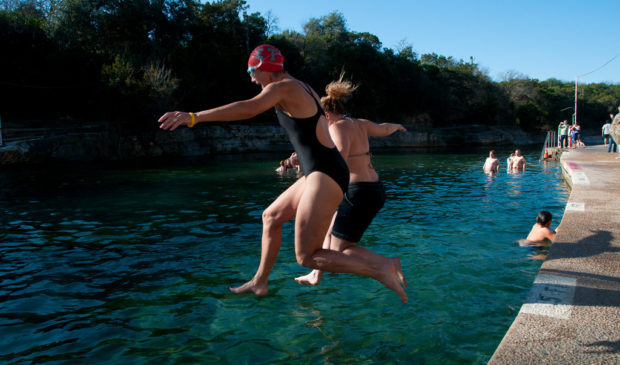Aquatic Master Plan Task Force moves forward
Tuesday, September 5, 2017 by
Jessi Devenyns It’s no secret that Austin city pools are on life support. Last month, City Council put off a vote on the dense and troubling Aquatic Master Plan. Instead, Council members created a task force to take a closer look at a plan that was nearly four years in the making.
The task force will be composed of four members of the Parks and Recreation Board. At the board’s most recent meeting, Chair Jane Rivera nominated herself along with board members Rick Cofer, Richard DePalma and Dawn Lewis to the task force. The nominations were voted into appointments with no opposition.
Board Member Michael Casias commented on the motivation behind the formation of this task force saying, “There’s a bottom line here. (The city is) going to have to close pools, and they’re just looking for some cover.”
Rivera responded that she does not intend for this task force to become a decommissioning plan. Instead, she hopes to meet with those who are contacting the board about the issues faced by city pools and see if there are ways to improve the status or find an alternative solution. She did acknowledge that despite the task force’s best efforts, she does not expect everyone who is affected by the transitions to see the outcome as satisfactory.
“I recognize that it is an important task that we need to take on as a city. It’s not really the Parks and Recreation Department’s responsibility. It is the City Council’s responsibility to make the decision to close the pools,” she said.
Board Member Francoise Luca asked Rivera if the appointees on the task force will consider alternative uses for any decommissioned pools. Rivera confirmed this to be the case and that, in addition, the task force will focus heavily on researching alternative funding sources.
Despite the touchy nature of the politics surrounding the potential decommissioning of certain city pools, Rivera acknowledged that she appreciated Council giving the Parks and Recreation Board a chance to speak with staff and the community about how they can potentially procure a better solution than simply closing the pools, which she did concede were in dire condition.
“I am a 37-year resident of East Austin, my husband is a lifetime resident,” she said. “The pools we have today are the same ones my husband learned to swim in, and that’s the real problem.”
DePalma noted that another problem that the current situation brings to light is that of inequitable access to aquatics. He cited a May 2017 study by the USA Swimming Foundation that demonstrated that “64 percent of African-American children, 45 percent of Hispanic children, and 40 percent of Caucasian children” have low swimming skills or are not swimming at all. Overall, 79 percent of kids whose families have incomes less than $50,000 have no or low swimming abilities.
While these demographic inequities in access to aquatics will be considered by the task force, it will also address a plan that includes possible pool closures, a prioritization of investments and the building of new aquatic facilities.
In response to the formation of this task force, John Rooney, the program coordinator at the Austin Parks Foundation, came to congratulate board members on taking on this weighty task. He said that the Aquatic Master Plan makes painfully clear that the city cannot afford to delay action or it will exacerbate the already dire aquatics financial situation that it is facing. “The Austin Parks Foundation stands ready in any and every way possible to assist,” he offered.
Kimberly McNeeley, the acting director of the Parks and Recreation Department, also gave her support. “You need to let us know what our staff can do to help us support your work,” she told the newly anointed task force.
Alan Pease, a member of the Aquatic Advisory Board, came to give the board some background information. “We’ve been meeting for three or four years on this now,” he told board members. “Thirteen thousand people have already given their input on this.” He suggested that, based on the feedback that the Aquatic Advisory Board has already seen on this issue, the task force hold a meeting in Council chambers where everyone can voice their opinion. He also reminded board members that the longer they take to make a decision, the more it will cost.
“The pools are old, but they’re really only on life support at this point. Even if you fix them, they’re just going to break again,” he said.
Photo by Randall Chancellor made available through a Creative Commons license.
The Austin Monitor’s work is made possible by donations from the community. Though our reporting covers donors from time to time, we are careful to keep business and editorial efforts separate while maintaining transparency. A complete list of donors is available here, and our code of ethics is explained here.
You're a community leader
And we’re honored you look to us for serious, in-depth news. You know a strong community needs local and dedicated watchdog reporting. We’re here for you and that won’t change. Now will you take the powerful next step and support our nonprofit news organization?










